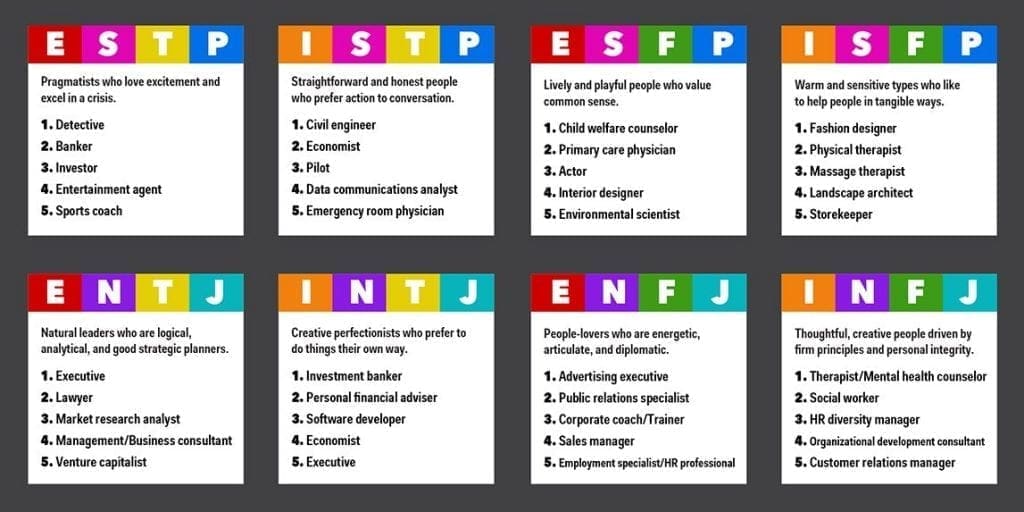16 Personality Types in Organizations

The MBTI has been puzzling and amusing for me. Since I’ve learned about it, I’ve been reading endlessly about the different types and grew fond of a handful and my own. While reading and understanding, I’ve accidentally on purpose, somewhat modified my personality and… well, let’s just say I’m in a confusing state of confusion and contradiction right now. Sad but true.
So yes, the search for truth within. And now, I’m going to share the characteristics of these 16 types in a workplace environment.
INTJ
INTJ’s are very independent and prefer working alone. They are perfectionists who love challenges and want complete responsibility for the task, believe that others are only going to slow them down. They enjoy brainstorming in the workplace, but do not like to focus on details or emotional arguments. They dislike small talk, do not enjoy manual work, and would rather deal with abstract ideas and concepts (this makes them ideal for research and professor jobs at universities). They are private and formal, and keep their personal affairs to themselves. They pride themselves in having sharp minds, yet are also prone to be very judgmental and not respect people they see as incompetent. They tend to stay out of office gossip. As managers, have very high standards and value competence and independent thinking, Willing to give their subordinates a lot of freedom at work and treat them as equals, don’t like socializing or schmoozing to move up in position at work or those who engage in gossip or manipulation. INTJ’s are more interested in strategy rather than tactical implementation and prefer efficiency over tradition.
INTP
INTP’s are insightful and unbiased. They also stay out of office gossip and prefer to discuss theory and work related matters rather than engage in small talk with coworkers. They prefer working alone and have very high standards. They are very tolerant and flexible and will consider ideas of coworkers or subordinates as long as they are logical. They dislike managing people and don’t seek out power roles, instead preferring to be highly paid experts. As subordinates, they innovative, original and resourceful, but want a lot of freedom in how they do their work. Job security is valued above all else. Although they generate new creative ideas, they are not good at implementing them and need someone who can focus on the details of making an idea happen.
INFJ
Very rare personality type that is more idealistic than the rest. They are very agreeable colleagues and dislike to get involved in drama or tense situations. Although they are very serious about getting their work done and have high standards, they place a great priority in creating a favorable atmosphere with their colleagues and balancing everyone’s interests. They are quick to help and seek harmony at work. Because of their ability to communicate well, they are able to motivate and inspire others if placed in a leadership role. They must see their work as providing a source of meaning otherwise they will grow bored and unhappy.
INFP
INFP’s like INFJ’s are also very idealistic. They may come off as shy but they are very persistent and passionate about their chosen “cause”. INFP’s are good at language and can quickly pick up new languages. They make great writers and are very creative. To coworkers they may come off as shy and reserved, partly due to the fact that they are one of the “Introverted” personality types. They are afraid of conflict and seek to work in pleasant cooperative environments. They get easily stressed out and would find it difficult to criticize or discipline someone if they are put into a supervisory or management role. They also avoid getting too personally close to their peers although they are nonetheless friendly and willing to help. They can work well in teams and are great at dealing with people in service oriented professions. They care more about emotional and moral reasons for doing things rather than cold logic or efficiency.
ISTJ
Value facts and information and are very formal. They do everything according to protocol. They focus on fulfilling their duty and are very suited to work in the legal profession, politic, military or law enforcement. Although they dislike abstract theorizing, they like and are capable of implementing ideas and making things happen. They are not as open as other personality types, and are awkward with emotional exchanges such as offering emotional support to coworkers– therefore they are not best suited for professions that focus on a caregiver role. They value responsibility, honor, and dedication and are harsh on those who fail to meet these standards or break the rules.
ISFJ
Best suited to work in medicine or social work, or any helping professions. Very idealistic and altruistic. Because they feel uncomfortable bragging or advertising themselves, they may easily get passed over for promotions and their hard work may go unnoticed. Sometimes they take on too much work. They are informal and make friends with their colleagues– they prefer to work in teams and in supportive environments where everyone is on friendly terms and personable. Although they can use their social networks to advance in their career, it is unlikely that they will. ISFJ employees also need reassurance and to know that they are valued. They are very traditional and do not like change in job tasks or organizational change.
ISTP
The ISTP personality type has two opposites. They are logical and stable but also spontaneous and excitable when it comes to an idea that they love. They have less boundaries about personal space and can seem to stick their noses into other people’s projects and then be surprised when they do not get a good reaction. They are good at applied scientific professions like engineering– application matters to them over theory and abstract ideas, although they can grasp these quickly and easily. They dislike rules and guidelines and can get bored if they don’t see how something will be applied to the real-world. They are prone to being stubborn and unwilling to change their own working habits to accommodate others.
ISFP
ISFP’s are the most spontaneous and they love change and are unafraid with taking risks and experimentation. Their independence and willingness to take risks and deep desire for freedom, mean that they would do well as entrepreneurs. While they are very social and tolerant, they are also sensitive and need reassurance and appreciation from their colleagues and supervisors. They are not good at implementing ideas because they dislike long-term planning and may not pay much attention to detail. Furthermore, they dislike managing styles which impinge on their ability to have freedom at work and set their own schedule. They believe that if they get their work done, rules and policies are not required. Since they seek to be on good terms with everyone, it may be difficult for them to act as supervisors when they have to fire or discipline an employee. They can put their talents to work at negotiating with employees instead.
ENTJ
The best personality type to lead and inspire people, they are very convincing and charismatic and can be good sales people, politicians, and motivational speakers. They are very adept at thinking long-term and strategising to form long-term solutions. They can be very stubborn and forceful, and this may work to their advantage in business negotiations where they are unlikely to give up without achieving their goal or convincing the other party. They’re weakness is alienating people by not paying attention to their feelings, thinking that they can achieve results on their own and having very high standards.
ENTP
ENTP’s love a challenge and exploring different points of view. They may argue for the sake of arguing, and love debates and political discussions and do not really care too much about being liked. They pride themselves in being very intellectual and knowledgeable about diverse facts and various topics. They don’t pay much attention to a strict, work hierarchy and can even challenge their managers and supervisors without a second thought. They are unafraid of conflict but at the same time are amiable and have a good sense of humor. Nonetheless, they should try to be more sensitive to people’s feelings when stirring up debates, as they can come off as condescending and rude to their colleagues. They’re weakness is being absent minded and juggling various tasks and projects simultaneously, without seeing them through to completion. They are good at innovating, especially working on problems which are difficult and require open-mindedness to solve.
ENFJ
Influential, charismatic and genuinely concerned about others and altruistic. In tune with their feelings and that of others, they can be very perceptive at uncovering the underlying motivations behind people’s actions. They can make great negotiators and politicians. They try to achieve the best possible situation for all parties and are very successful at communicating effectively and getting cooperation. They’re weakness is becoming over-involved in other people’s problems or burning out emotionally. They also do not deal well with criticism and may become discouraged and unsure of their own capabilities. They are very reliant on social acceptance and respect, and when placed in a warm, fostering, positive social environment, can excel to their full potential.
ESTJ
Traditional and love order to the point where they can maladaptively resist change. They value social connections and love organizing people, although as managers they may micro-manage and want to control all aspects of the employees schedule/tasks. They are prone to become perfectionists and dislike those who do not honor authority and rules. Although they accept criticism, they are unlikely to change workplace practices that have been done in the past in favor of something more new and efficient. They are dedicated and tireless workers, seeing it as their responsibility to complete the task to the best of their ability.
ESTP
Short term thinking instead of long term planning. They are social and direct/honest, but may come off as rude and insensitive. They usually are popular due to their open mindedness and charm. They are not very formal and don’t see rules as written in stone, and therefore are unlikely to follow them if they deem them unreasonable or impinging on their personal values. They dislike theoretical discussions and focus more on the practicalities of life. They are convincing and good at telling stories and networking and can therefore excel in sales, politics, or business. Their weakness is getting bored and jumping from different projects. They are very practical and are more motivated by material rewards like money and property than things like status and respect.
ESFJ
ESFJ’s are very social and seek to create harmony. They uphold order and are team players. They are good in social and helping roles such as social workers. They are sensitive and kind and rarely step on other people’s toes. They do not like disagreements or tensions and try to fix these with tact when they arise. Their weakness is a dislike of working alone and an inability to take criticism well. They are very sensitive and need to feel appreciated. They can do detail-oriented, routine tasks quite well, as long as their role is structured and defined. They prefer the security of structure over having freedom and improvising in their job, and they are unlikely to challenge the status quo because they feel secure with upholding tradition and existing power structures. They would be unlikely to challenge a manager or supervisor and may be afraid to voice their ideas, especially if they are a bit new or unusual from everyday standard practice.
ESFP
ESFP’s are also very social and like to get lots of attention, both in their personal life and at work. They can easily pick up on people’s emotions and offer advice and support. They are usually very popular with their colleagues and leaders in social situations. Their weakness is being overly emotional and putting off practical matters, which can make them seem thoughtless and irresponsible. They are unafraid to take risks, but their focus on the immediate reward may jeopardize the long-term effectiveness of their plans. They are also poor at receiving criticism and are prone to take it personally and hold grudges. ESFP’s treat their subordinates as equals and make fair and honest managers. While they are very creative, they may get lost in their own thoughts and forget important tasks and deadlines. ESFP’s need to focus on not getting carried away by their enthusiasm and focus on the immediate present and to improve their organizational skills.
ENFP*

ENFPs love to interact with lots of people. Socializing recharges their batteries and they can use their love of being social and acute social perception to become popular with their colleagues and managers. ENFPs focus on the world of possibilities and look to the future, which makes them great at strategising. They are good at abstract thinking and prefer to be inventive and innovative and focus on the big picture and not the tiny details. Because they are a “Feeling” personality type, ENFPs place a greater value on feelings and values rather than on logic when making decisions. This is in contrast to other personality types which may place greater weight on being logically consistent and fair and impartial rather than balancing the needs, emotions, and welfare of everyone involved– this is something the ENFP can excel at to come up with solutions which make every party happy. In this way, they can be good negotiators. ENFPs tend to empathize with others, and let their emotions guide their decisions. They are good at understanding what people are feeling and genuinely care about others.
ENFPs are flexible and like to have many options and be spontaneous. Their strength is being very adaptable to change. Nonetheless, this makes them also hate and resist routine and others who try to impose routine on them. They may come off as disorganized and could be prone to procrastination and leaving tasks undone. Psychologist David Keirsey identifies ENFPs as “Champions” because they can speak to motivate others with their powerful convictions. While the ENFP ‘zeal, charisma, and creativity can make great leaders, a caution for ENFP’s in a leadership role is over-promising and under-delivering. They are natural leaders, but do not really like to control people and also resist being controlled by others.
They dislike routine, rules and procedures, and anything requiring strict attention to detail. These kind of jobs (ie administrative) will bore them. They prefer to focus on the future and can make great consultants who can revamp and re-energize/restructure organizations. While they are great at generating new ideas, they sometimes put off important tasks until the last minute and leave projects unfinished. ENFPs are prone to become easily distracted, especially if a task seems boring, uninspiring, or something they already know.
ENFPs are good at many different things and can be successful at many careers. Nonetheless, they will be happiest when they can work with people and generate new ideas. They will not be happy in positions that are confining and regimented. ENFP’s match careers like a psychologist, social worker, TV personality, politician, or any other career that is flexible, allows them to work independently, and creatively and where they can put into use their skills of perceiving people’s emotions and strategising based on the “overall, big picture”. The ENFP personality type is a creative, energetic, outgoing and great at communicating with others. Because they are empathetic and interested in people, they often do well in service-oriented careers. They are intuitive and perceptive about people and make good team players.











Responses